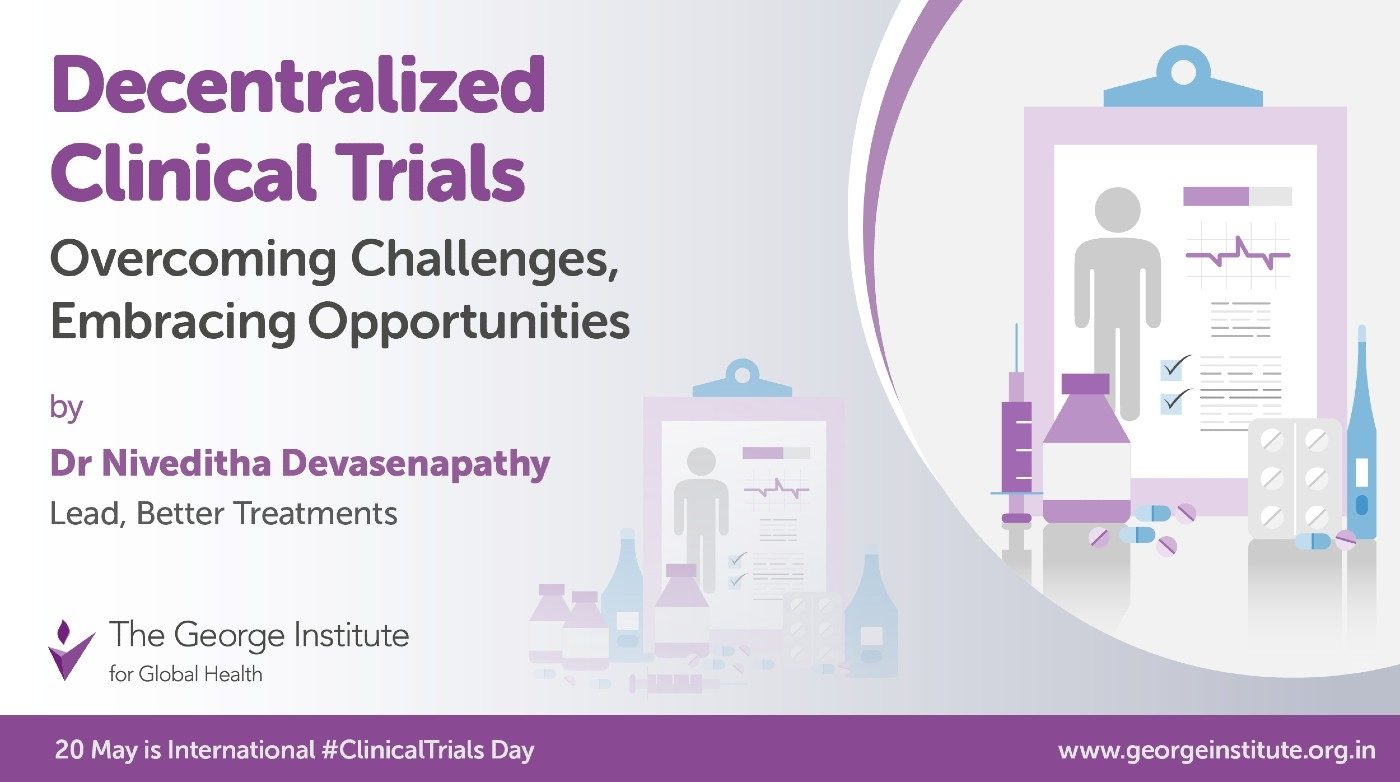
Decentralized Clinical Trials: Overcoming Challenges, Embracing Opportunities
The 2023 International Clinical Trial Day to be observed on May 20, focuses on, Decentralized Clinical Trials: Challenges and Opportunities. Celebrating the day, The George Institute for Global Health aims to seek attention to the theme of decentralized clinical trials (DCTs) and the remarkable challenges and opportunities DCTs present.
As a clinical trialist and researcher, I recognise the transformative potential of DCTs in shaping the future of medical research and improving patient outcomes. It is crucial that we understand the significance of decentralization and actively work towards harnessing its benefits to advance clinical research.
Traditional clinical trials often require patients to travel to centralized research sites to complete trial-related activities such as collecting medications, providing biological samples such as blood /urine and completing questionnaires. This can pose significant barriers to participation. Factors such as geographical distance, disabled unfriendly transportation, and the associated costs can demotivate many individuals from participating in trials. This disproportionately affects vulnerable populations and dependent population such as women and elderly, thereby undermining the inclusivity and diversity of study participants. Decentralized trials, on the other hand, aims to bring the trial directly to the patient's doorstep, leveraging technology and innovative approaches to bridge the gap between researchers and participants.
Implementing trials with elements of decentralization will require remote data collection of patient-reported outcomes, the use of wearable devices for measuring body functions, and telemonitoring of health status. Thus DCTs enhance convenience and reduce the burden on patients and families. Moreover, DCTs have the potential to improve data accuracy and, increase patient retention, leading to more robust and reliable study results.
However, as we embrace the opportunities presented by decentralized trials, we must also address the challenges associated with their implementation. One key concern is ensuring data privacy and security. With sensitive medical information being transmitted electronically, stringent measures must be in place to safeguard patient confidentiality. Regulatory frameworks need to adapt to the evolving landscape of DCTs, by providing clear guidelines for the use of medical data for research purposes and ensuring ethical standards are upheld while maintaining the highest level of patient protection.
Furthermore, while DCTs offer greater accessibility, we must ensure that technology-driven solutions do not exacerbate existing health disparities. It is essential to bridge the digital divide and ensure equitable access to the necessary tools and resources for participation. Collaboration between researchers, policymakers, and technology developers is vital to address these disparities. Patient advocacy groups can play a vital role in demystifying clinical trials.
Decentralized trials also require a paradigm shift in the role of investigators, funding agencies, regulatory agencies and clinicians. Investigators must adapt to new methods of participant recruitment, monitoring, and data collection. Research sites should be equipped with the infrastructure and resources to support remote study visits, and implement innovative technologies effectively. Funding agencies should promote decentralization to motivate researchers to actively invest time and effort. Collaboration and capacity-building initiatives will play a critical role in enabling researchers and trial managers to navigate this evolving landscape and embrace the potential move toward decentralization.
The COVID-19 pandemic has underscored the urgency of adopting decentralized approaches in clinical research. The unprecedented challenges posed by the pandemic necessitated the rapid deployment of remote data collection methods and virtual trial visits. This experience has provided valuable insights and accelerated the acceptance and implementation of DCTs. As we emerge from the pandemic, we have an opportunity to integrate the lessons learned into our future research endeavours.
International Clinical Trial Day serves as an impetus to our collective responsibility to promote and advance clinical research. Embracing the concept of decentralized trials is a crucial step towards achieving patient-centred, accessible, and inclusive research. By leveraging technology and innovative approaches, we can overcome geographical barriers, enhance patient engagement, and generate high-quality evidence to inform clinical practice efficiently.
As we celebrate International Clinical Trial Day 2023, let us embrace the potential of decentralized trials, collaborate across disciplines, and work together to address the challenges and seize the opportunities they present. By doing so, we can pave the way for a future where clinical research is truly patient-centric, transparent, inclusive, and transformative.
Dr Niveditha Devasenapathy is trained in clinical research and applied statistics with over 15 years of experience in clinical and public health research. She currently leads the Better Treatment strategic priority area at The George Institute for Global Health.


